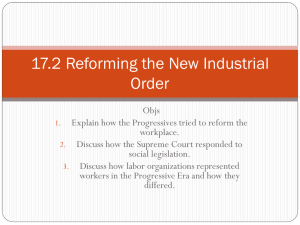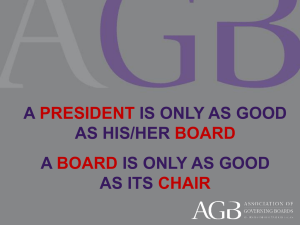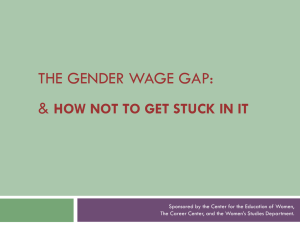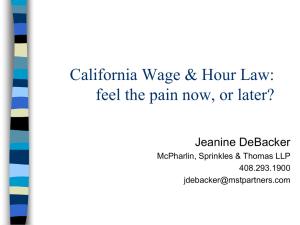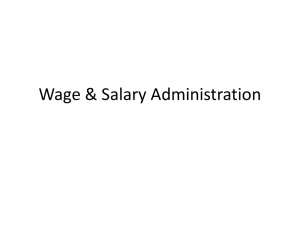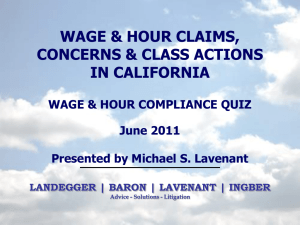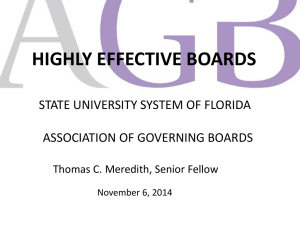View / Detail - national union of journalist ( nuj india )
advertisement
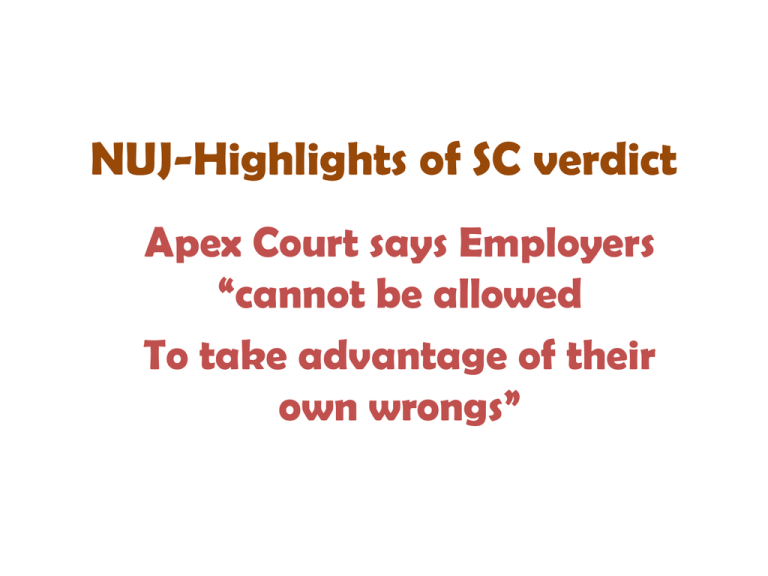
NUJ-Highlights of SC verdict Apex Court says Employers “cannot be allowed To take advantage of their own wrongs” • NUJ(I) lists highlights of the SC verdict on wage board award petition by Newspaper industry managements • (7 pages, 2142 words ) • 1.In dismissing the plethora of petitions filed by different newspaper and news agency managements in the Supreme Court against the Government notification of November 2011 accepting the bulk of the recommendations of the two wage boards headed by Justice (Retd.) Majithia, the apex court found that the employers did not provide the data about their finances asked for by the Boards. • Having denied the Boards the data despite repeated calls to give it, the industry managements “cannot be allowed to take advantage of their own wrong and impugn the recommendations of the Wage Boards as not being based on their data when they eluded to submit the said data in the first place”. • 1.1 This is one of the severe expose’ of the tactics adopted by NP managements that the Hon’ble Supreme Court’s verdict reveals to “elude” the Boards and then complain about the recommendations being a denial of natural justice to them. The National Union of Journalists (India) which along with other newspaper employee federations participated in defending the interests of the employees in the apex court, has culled out major findings of the court regarding the claims that the management petitioners made before the court. • 1.2 NUJ(I) members must remember that the managements not only lined up 12 top senior advocates practicing in the court to argue their case, they also sought to prolong the proceedings by coming to the court one by one and then forcing adjournment of hearings. The case filed on……. had to be moved from one Bench of the court to another for two years and ultimately was decided by a three judge Bench headed by the Chief Justice himself. • 1.3 Besides Chief Justice P. Sathasivam, the other judges who constituted the Bench were Justice Ranjan Gogoi and Justice S.K. Singh. The Bench unanimously rejected all the claims made by the battery of top lawyers fielded by the managements. “We hold the recommendations of the wage board are valid, based on genuine and acceptable considerations and there is no valid ground for interference” (by the court), the Chief Justice who wrote the unanimous judgment said in deciding on the managements’ petitions. • 1.4 The working journalists and other employees unions including the NUJ(I) were represented in the court by senior advocate and noted human rights champion Mr. Colin Gonzalves. The unions fought under the banner of the Confederation of All Unions and were ably and determinately led by Mr. M. S. Yadav and his team from the PTI Federation. Mr. Yadav is the General Secretary of the Confederation also. 1.5 From the NUJ(I) side, Dr. N. K. Trikha was a member of the Majithia Wage Board and the team arguing the case before the Board was led by our past president Mr. Rajendra Prabhu and consisted of (late) M. D. Gangwar, Mr. Hari Om, Mr. Ashok Malik with assistance from several other members and state units and the office staff of the NUJ(I). Mr. Ravi Meenakshisundaram in Chennai provided legal help. NUJ(I) closely worked with Mr. Yadav in defending the case in the apex court and in assisting senior advocate Mr. Gonzalves in his most able presentation of the workers’ case against a battery of senior advocates employed by the petitioner managements. 1.6All credit to Mr. Gonzalves and Mr. Yadav. Legal assistance in the court also came from advocate Mr. Pal and advocate and trade unionist Mr. Parmanand Pandey. In a petition by the unions during the pendency of the case, on the contempt of court by the managements, senior advocate Mr. Krishnamani appeared for our side. We are grateful to him also. Mr. Bharat Bhushan advocate also assisted our side during the hearings. The PTI federation bore the major brunt of the gathering of resource for conducting the case and also for gaining access to various documents and approaching government and political party officials to shore up workers’ case. The Government strongly defended the Notification through the learned Solicitor General Mr. Mohan Parasar assisted by….. 1.7 The court said the new pay scales and other allowances notified by the Government on November 11 based on the recommendations of the Majithia Wage Boards will be applicable from the date of notification (11 months after the recommendations were submitted). The arrears should be paid within a year in four equal installments and “continued to pay revised wages from April 2014 onwards”. The specific order calling on the owners to pay the wages as per the new wage scales etc., leaves no room for the newspaper and news agency establishments to evade payment on one pretext or the other which they were resorting to earlier, the NUJ(I) finds. This also obviates need for any further agitation by the unions to get the Notified benefits implemented, as non-implementation will be liable to be interpreted as contempt of the apex court, according to us. • 1.8 The NUJ(I) also finds from the verdict that the managements will have to pay the so called part time employed journalists the benefits as recommended by the Board and notified by the Government. This will considerably provide some relief to this most suffering section among working journalists. The NUJ(I), it may be recalled, had told the Majithia Board that in effect all so called part timers were actually full time on the vigil for news break in their area and responsible to file the story anytime day or night. Here are the highlights of the apex court’s verdict: 2. On the vires of the Working Journalists (conditions of service and other miscellaneous provisions) Act: • “In the light of the aforesaid discussion, we are of the opinion that the challenge as to the vires of the Act on the premise of its being ultra vires of the Constitution and violation of fundamental rights is wholly unfounded, baseless and completely untenable.” On the newspaper industry being discriminated against: 3. “The contention of the petitioners that though the newspaper industry may be growing, the growth of the electronic media is relatively exponential, in fact, substantiates the very necessity of why a wage board for working journalists and other newspaper employees of the newspaper industry should exist.” 4. On the complaint about the improper constitution of the Wage Boards: • “ On behalf of the petitioners it was contented that there was a defect in the constitution of the wage boards as Mr. K. M. Sahni and Mr. Prasanna Kumar were not independent members, this fatally violates the constitution and proceedings of the wage boards. “merely because Shri. K. M. Sahni was a part of the Government that took the decision to set up the wage boards does not automatically follow that he ceased to be an “independent” member of the wage boards. We are satisfied that Shri. K. M. Sahni is an independent member of the boards and cannot be considered to be “biased” in any manner.” • 4.1 On the objections to Mr. Prasanna Kumar’s membership, the court observed: “It is well established that mere apprehension of bias is not enough and there must be cogent evidence available on record to come to the conclusion. “The contention of the petitioners alleging bias against independent members of the wage boards being biased merely on their past status, is entirely baseless in law and amounts to imputing motives. Further the petitioners have nowhere established or even averred that the independent members are guilty of legal bias as expressed in (quotes case law)” On functioning of the Wage Boards: 5. “On perusal of the materials available , we are satisfied that the wage boards have functioned in a fully balanced manner. Besides, it is a fact that the petitioners had challenged the constitution of the wage boards before the High Court of Delhi; admittedly the High Court declined to grant interim relief…….It is also pertinent to take note of the fact that the petitioners have opted for challenging the independence of the nominated independent members only after the recommendations of the wage boards were notified by the Central Government……” 6. ON irregularity of procedure • Commenting on the managements’ complaint that the Majithia boards prepared their report “In a hasty manner and subsequently the recommendations have been accepted by the Central Govt. without proper hearing or affording opportunity to all stakeholders…. ”, the court noted the various opportunities given to the employers as well as their refusal to provide the called for data and said: • “We are of the view that the petitioners cannot be allowed to take advantage of their own wrong and impugn the recommendations of the wage boards as not being based on their data when they eluded to submit the said data in the first place.” 7.On the allegation of wrong procedure and lack of independent functioning of the boards: • “After going through the record of proceedings and various written communications , we are fully satisfied that the wage boards’ proceedings have been conducted and carried out in a legitimate approach and no decision of the wage boards is perceived to have been taken unilaterally or arbitrarily………..we find no irregularity in the procedure adopted by the impugned wage boards.” On extraneous factors and Capacity to Pay: 8. “After perusing the relevant documents we are satisfied that comprehensive and detailed study has been carried out by the wage boards by collecting all the relevant material information for the purpose of wage revision. The recommendations are arrived at after verifying the pros and cons of various methods in the process and principles of wage revision in the modern era. It cannot be held that the wage structure recommended by the Majithia wage boards is unreasonable.” On the objections regarding News Agencies Wage Revision: 9. Noting the version given by the respondents ( govt. and PTI union and other federations) that the question of capacity to pay of the news agencies was separately considered the court observed:“(the court’s) interference is allowed to a limited extent to examine the question as to whether the wage board has considered the capacity to pay of the news agencies. It would be inapposite for the court to question the decision of the specialized board on merits when the board was constituted for this sole purpose.” On the objections to variable pay and other concepts in the recommendations: 10. The managements had characterized the concept of variable pay as “totally unreasonable , irrational and places extra and unnecessary burden on the newspaper establishments.” They also alleged that “there was complete nonapplication of mind to insert the so-called variable pay concept.” The respondents (the unions) had pointed out that this variable pay concept was not new and was subsumed in the Manisana Wage Board recommendations; only the terminology differed. The court observed:• “We have carefully scrutinized all the details. It is clear that the recommendations of the Sixth Pay Commission had NOT been blindly imported/ relied upon by the wage board. The concept of “variable pay” contained in the Sixth Central Pay Commission has been incorporated into the wage board recommendations only to ensure that the wages of the newspaper employees are at par with the employees working in the other government sectors. Such incorporation was made by the Majithia wage board after careful consideration, in order to ensure equitable treatment to employees of the newspaper establishments and was well within its rights to do so.” The court observed:• The court also justified grant of 100 per cent neutralization for DA rejecting contention of the managements that a reference to the decision before 1995 is “irrelevant”. Other issues: 11. On the charge of non- incorporation of regional differences in the emoluments, the court held that it was “satisfied” the board had followed certain well laid down principles and norms” in its recommendations. • On the charge that the board had in recommending higher pay scale after the top rung had been reached it was going into promotion that was beyond its scope, the court held that this was not so and was only a matter of prioritization “after completion of certain number of years.” Operative part 12. In view of all these the court held “that the recommendations of the wage boards are valid in law, based on genuine and acceptable considerations and there is no valid ground for interference under Article 32 of the Constitution of India.”. After “dismissing with no order on costs” the numerous petitions of different managements, the court observed:- The Court Observed:• “The wages as revised/determined shall be payable from 11. 11. 2011” (that is, the date of notification which was 11 months after the boards gave their report). All the arrears up to March 2014 shall be paid to all eligible persons in four equal installments within a period of a year from today and continue to pay the revised wages from April 2014 onwards.”
